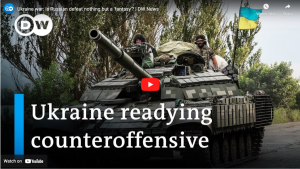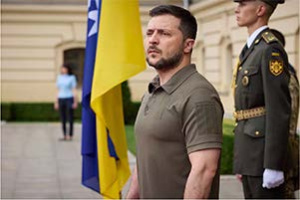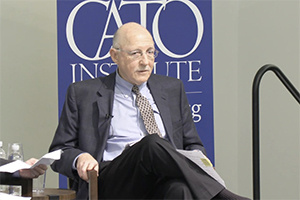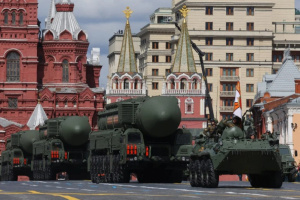
Barry R. Posen
Ford International Professor of Political Science
Security studies; international relations; international security; military strategy; restraint; nuclear studies; military doctrine.
Biography
Barry R. Posen is Ford International Professor of Political Science at MIT, former Director of the MIT Security Studies Program, and serves on the Executive Committee of Seminar XXI. He is the author of Restraint: A New Foundation for U.S. Grand Strategy, (Cornell University Press 2014), Inadvertent Escalation: Conventional War and Nuclear Risks (Cornell University Press 1991), and The Sources of Military Doctrine (Cornell University Press 1984). The latter won two awards: The American Political Science Association's Woodrow Wilson Foundation Book Award, and Ohio State University's Edward J. Furniss Jr. Book Award. He is also the author of numerous articles, including "The Devastation of Gaza Was Inevitable," Foreign Policy, Feb. 14, 2024; "Ukraine has a Breakthrough Problem," Foreign Policy, Aug. 3, 2023; "Russia's Rebound: How Moscow has partly recovered from its military setbacks," Jan. 4, 2023; “Ukraine’s Implausible Theories of Victory: The Fantasy of Russian Defeat and the Case for Diplomacy,” Foreign Affairs, July 2022; "Europe Can Defend Itself," Survival, December 2020; "The Rise of Illiberal Hegemony--Trump's Surprising Grand Strategy," Foreign Affairs, March/April 2018; "It's Time to Make Afghanistan Someone Else's Problem," The Atlantic, 2017; "Contain ISIS," The Atlantic, 2015, “Pull Back: The Case for a Less Activist Foreign Policy,” Foreign Affairs, January/February 2013; and "Command of the Commons: The Military Foundation of U.S. Hegemony," International Security, Summer, 2003. He is a Fellow of the American Academy of Arts and Sciences. In 2016 he was appointed Henry A. Kissinger Chair in Foreign Policy and International Relations at the Library of Congress, John W. Kluge Center. He is the 2017 recipient of the International Security Studies Section (ISSS), International Studies Association, Distinguished Scholar Award, and in 2019 received the Notre Dame International Security Center's Lifetime Achievement Award.
He has been a Council on Foreign Relations International Affairs Fellow; Rockefeller Foundation International Affairs Fellow; Guest Scholar at the Center for Strategic and International Studies; Woodrow Wilson Center Fellow, Smithsonian Institution; Transatlantic Fellow of the German Marshall Fund of the United States; and a Visiting Fellow at the John Sloan Dickey Center at Dartmouth College.
Research
Professor Posen studies U.S. grand strategy and national security policy. His current research examines whether the diffusion of power away from the United States can best be understood as the emergence of a multipolar structure of power, and if so, how the United States should navigate this change.
Posen’s project aims to research the “rules of the road” of 21st Century multipolarity. To do so, he looks at how states and statesmen navigated multipolar systems in the past. But there are limits to drawing lessons from history, due to the truly global nature of a future multipolar system, if it emerges. Further, nuclear weapons have changed security competition among states, and the past half-century has seen major changes in conventional warfare as well. Posen aims to imagine the kind of multipolar security competition that might prevail, given these changes. Posen published an article exploring the impact of multipolarity on the management of civil wars in Daedalus (Fall 2017).
Posen continues to study current U.S. national security policy. He published his interpretation of the grand strategy of the Trump Administration, "Illiberal Hegemony," in Foreign Affairs (March/April 2018). And he contributed to the debate on how to address the North Korean nuclear weapons program in the New York Times."The Price of War With North Korea" (December 2017). He remains actively engaged in the debate on U.S. Grand Strategy, promoting Restraint whenever there is an opportunity. Finally, he follows European security issues, and lives in hope that one day Europeans will assume responsibility for their own security.
Recent Publications
Restraint: A New Foundation for U.S. Grand Strategy, Cornell University Press, 2014.
"Pull Back: The Case for a Less Activist Foreign Policy," Foreign Affairs, January/February 2013.
"Overkill," (part of "The Containment Conundrum: How Dangerous is a Nuclear Iran?") Foreign Affairs, July/August 2010, pp. 160-163.
"Emerging Multipolarity: Why Should We Care?" Current History (November 2009) pp. 347-352.
Breakthroughs: Armored Offensives in Western Europe, 1944. With Eric Heginbotham, Nick Beldecos, Kevin Oliveau, Jonathan Ladinsky, Brian Nichiporuk, Eugene Gholz, and and Ken Pollack. July 2009.
"Restraining Order," The American Interest, Vol. 3, No. 3, January-February 2008, pp. 94-97.
Teaching
| 17.462 | Innovation in Military Organizations |
| 17.468 | Foundations of Security Studies |
| 17.478 | Great Power Military Intervention |
| 17.482-3 | U.S. Military Power |
| 17.484 | Comparative Grand Strategy and Military Doctrine |
| 17.951 | Intelligence: Practices, Problems and Prospects |
News
Biography
Barry R. Posen is Ford International Professor of Political Science at MIT, former Director of the MIT Security Studies Program, and serves on the Executive Committee of Seminar XXI. He is the author of Restraint: A New Foundation for U.S. Grand Strategy, (Cornell University Press 2014), Inadvertent Escalation: Conventional War and Nuclear Risks (Cornell University Press 1991), and The Sources of Military Doctrine (Cornell University Press 1984). The latter won two awards: The American Political Science Association's Woodrow Wilson Foundation Book Award, and Ohio State University's Edward J. Furniss Jr. Book Award. He is also the author of numerous articles, including "The Devastation of Gaza Was Inevitable," Foreign Policy, Feb. 14, 2024; "Ukraine has a Breakthrough Problem," Foreign Policy, Aug. 3, 2023; "Russia's Rebound: How Moscow has partly recovered from its military setbacks," Jan. 4, 2023; “Ukraine’s Implausible Theories of Victory: The Fantasy of Russian Defeat and the Case for Diplomacy,” Foreign Affairs, July 2022; "Europe Can Defend Itself," Survival, December 2020; "The Rise of Illiberal Hegemony--Trump's Surprising Grand Strategy," Foreign Affairs, March/April 2018; "It's Time to Make Afghanistan Someone Else's Problem," The Atlantic, 2017; "Contain ISIS," The Atlantic, 2015, “Pull Back: The Case for a Less Activist Foreign Policy,” Foreign Affairs, January/February 2013; and "Command of the Commons: The Military Foundation of U.S. Hegemony," International Security, Summer, 2003. He is a Fellow of the American Academy of Arts and Sciences. In 2016 he was appointed Henry A. Kissinger Chair in Foreign Policy and International Relations at the Library of Congress, John W. Kluge Center. He is the 2017 recipient of the International Security Studies Section (ISSS), International Studies Association, Distinguished Scholar Award, and in 2019 received the Notre Dame International Security Center's Lifetime Achievement Award.
He has been a Council on Foreign Relations International Affairs Fellow; Rockefeller Foundation International Affairs Fellow; Guest Scholar at the Center for Strategic and International Studies; Woodrow Wilson Center Fellow, Smithsonian Institution; Transatlantic Fellow of the German Marshall Fund of the United States; and a Visiting Fellow at the John Sloan Dickey Center at Dartmouth College.
Research
Professor Posen studies U.S. grand strategy and national security policy. His current research examines whether the diffusion of power away from the United States can best be understood as the emergence of a multipolar structure of power, and if so, how the United States should navigate this change.
Posen’s project aims to research the “rules of the road” of 21st Century multipolarity. To do so, he looks at how states and statesmen navigated multipolar systems in the past. But there are limits to drawing lessons from history, due to the truly global nature of a future multipolar system, if it emerges. Further, nuclear weapons have changed security competition among states, and the past half-century has seen major changes in conventional warfare as well. Posen aims to imagine the kind of multipolar security competition that might prevail, given these changes. Posen published an article exploring the impact of multipolarity on the management of civil wars in Daedalus (Fall 2017).
Posen continues to study current U.S. national security policy. He published his interpretation of the grand strategy of the Trump Administration, "Illiberal Hegemony," in Foreign Affairs (March/April 2018). And he contributed to the debate on how to address the North Korean nuclear weapons program in the New York Times."The Price of War With North Korea" (December 2017). He remains actively engaged in the debate on U.S. Grand Strategy, promoting Restraint whenever there is an opportunity. Finally, he follows European security issues, and lives in hope that one day Europeans will assume responsibility for their own security.
Recent Publications
Restraint: A New Foundation for U.S. Grand Strategy, Cornell University Press, 2014.
"Pull Back: The Case for a Less Activist Foreign Policy," Foreign Affairs, January/February 2013.
"Overkill," (part of "The Containment Conundrum: How Dangerous is a Nuclear Iran?") Foreign Affairs, July/August 2010, pp. 160-163.
"Emerging Multipolarity: Why Should We Care?" Current History (November 2009) pp. 347-352.
Breakthroughs: Armored Offensives in Western Europe, 1944. With Eric Heginbotham, Nick Beldecos, Kevin Oliveau, Jonathan Ladinsky, Brian Nichiporuk, Eugene Gholz, and and Ken Pollack. July 2009.
"Restraining Order," The American Interest, Vol. 3, No. 3, January-February 2008, pp. 94-97.
Teaching
| 17.462 | Innovation in Military Organizations |
| 17.468 | Foundations of Security Studies |
| 17.478 | Great Power Military Intervention |
| 17.482-3 | U.S. Military Power |
| 17.484 | Comparative Grand Strategy and Military Doctrine |
| 17.951 | Intelligence: Practices, Problems and Prospects |





